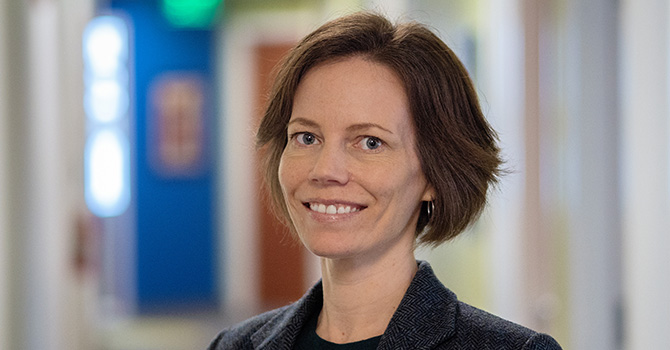Guiding Principles: Balancing Context and Evidence to Inform Policy

Katharine Bradley, PhD ’14
Senior Researcher, Mathematica
I moved out west after college and was looking for engaging work when my mother—herself a hospital administrator and School of Public Health alumna—suggested I inquire at the Trinity Health hospital in Boise, Idaho. The hospital hired me to direct a federal grant that supported expansion of health insurance coverage in the state. It was supposed to be a temporary position, but the funding was extended and I ended up staying in the role for years.
The grant project ultimately spearheaded a small expansion of Idaho’s Children’s Health Insurance Program (CHIP) and the creation of a premium assistance program that provided low-income adults with public funds to purchase commercial health insurance. I worked with the Idaho legislature and the Medicaid agency throughout the process and learned quite a bit about political compromise, in addition to health insurance. I have been working on Medicaid and health coverage ever since.
I didn't know I was interested in policy until I was doing it.
My mother’s career in hospital administration had steered me to public health, but health insurance policy is different than administration. I didn't know I was interested in policy until I was doing it. There is an endless amount to learn about Medicaid and CHIP, and state-level decisions about public coverage affect many people’s lives.
When the grant project ended, I took a detour to Australia for a research fellowship with the Australian Department of Health and Ageing and, after returning to Idaho, spent a year as a lobbyist for Idaho Medicaid. I drafted and supported the passage of 11 bills that established a set of new policies, including health behavior incentives like rewards for getting child wellness checks.
I get to create research evidence that can be added into the mix of considerations as states figure out how to shape Medicaid programs.
The lobbyist experience was positive overall but was so political that it made me want to change the mode of my work. I wanted to be able to consider research evidence in addition to political forces. I started at Michigan Public Health in the Health Services Organization and Policy doctoral program the following year. Now that I am equipped with my PhD, I get to create research evidence that can be added into the mix of considerations as states figure out how to shape Medicaid programs. This was, for me, the gift of being able to study public health at Michigan.
Since I finished my research training and joined Mathematica, I have spent most of my time on evaluations of experimental state Medicaid programs called section 1115 demonstrations. Section 1115 of the Social Security Act allows the federal government to approve a state’s experimental program if it promotes Medicaid objectives. Any state with a section 1115 demonstration must monitor and evaluate it, and the federal Centers for Medicare and Medicaid Services (CMS) has been working hard to establish better standards for how states can do this. I help CMS develop guidance for states on the evaluation process, and I also work on a cross-state evaluation of states like Michigan that expanded Medicaid via section 1115 demonstrations.
Working to improve policy evidence in this context is a deeply interdisciplinary effort. Medicaid—like many social programs—is politicized, and we have to acknowledge that political parties, stakeholder views, federalism, and other forces are major policy determinants even as we try to generate strong evidence on how well Medicaid policies work. Thinking about how CMS and states might need to weigh all of those factors as they assess demonstration performance helps me give them better advice. I was a Medicaid bureaucrat in Idaho and wrote my dissertation on Medicaid bureaucrats, so I feel fortunate to be conducting research in a space where policy relevance and meeting client needs are guiding principles.
- Interested in public health? Learn more here.
- Learn more about pursuing a doctoral degree in Health Services Organization and Policy.
- Read Generational Impact: Fifty Years of the PhD Program in Health Services Research and Policy.
- Read more stories about Health Management and Policy students, alumni, faculty, and staff.
- Support research and engaged learning at the School of Public Health.
